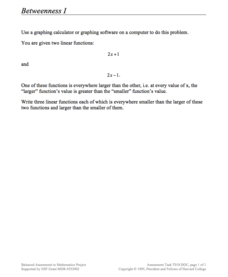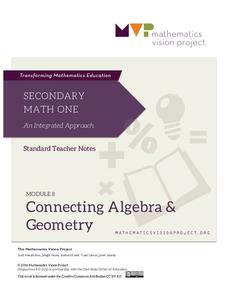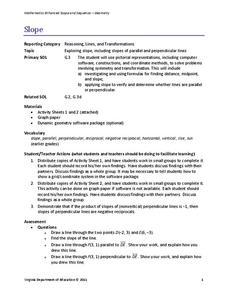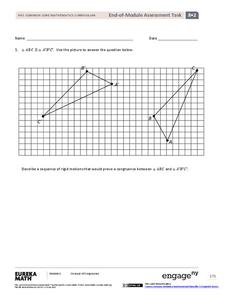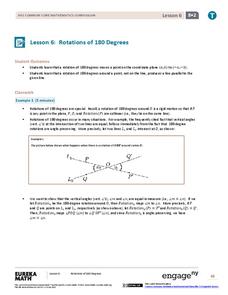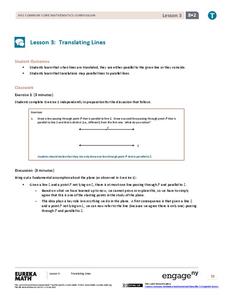Concord Consortium
Betweenness I
Just between us, this is a pretty cool lesson! Given two functions with the same slope, learners write three new functions whose outputs are all between the given functions. The question is open-ended, allowing pupils to explore the...
CK-12 Foundation
Parallel and Perpendicular Lines: Identify Types of Lines
Are there only three options: parallel, perpendicular, or intersecting? Scholars move a given line in an interactive to change its orientation with respect to another line. The interactive indicates whether the lines are parallel,...
CK-12 Foundation
Identify Line Types: Intersecting and Parallel Lines
Navigate your way through a lesson on types of lines. Individuals drag line segments to illustrate paths between pairs of houses on an interactive map. They determine if these line segment pairs are intersecting or
parallel.
CK-12 Foundation
Identify Line Types: Identify Types of Lines
If lines aren't parallel or perpendicular, then what are they? An interactive lets users rotate a line to change its orientation
with respect to another line. It then indicates whether the
lines are parallel, perpendicular, or...
CK-12 Foundation
Parallel and Skew Lines: Parallel or Not?
There's nothing askew about an informative resource. Pupils adjust one of two lines in an interactive to determine if the lines are parallel or skew. They answer a set of challenge questions about the lines.
CK-12 Foundation
Intersecting and Parallel Lines
Sometimes line segments just refuse to meet. Young mathematicians connect houses on an interactive map using line segments. They must then determine whether these line segment pairs are intersecting or parallel.
CK-12 Foundation
Equations of Parallel Lines: Exploring Equations
Same slope, different point — what's the same and what's different about an equation? Young mathematicians use an interactive to position a line parallel to a given line and through a given point. They observe that the equation will have...
CK-12 Foundation
Comparing Equation of Parallel and Perpendicular Lines: Parallel and Perpendicular Lines
It seems perpendicular lines have slopes which follow a specific rule. Scholars use an interactive to investigate this rule by moving a pair of lines on a coordinate plane. They find that perpendicular lines have slopes that are opposite...
Mathematics Vision Project
Transformations and Symmetry
Flip, turn, and slide about the coordinate plane. Pupils define the rigid motions and experiment with them before determining the relationships of the slopes of parallel and perpendicular lines. The sixth unit in a nine-part series...
Mathematics Vision Project
Connecting Algebra and Geometry
Connect algebra and geometry on the coordinate plane. The eighth unit in a nine-part integrated course has pupils develop the distance formula from the Pythagorean Theorem. Scholars prove geometric theorems using coordinates including...
02 x 02 Worksheets
Slope
What does slope have to do with lines? Pupils work with lines and determine the slope of the lines informally and with the slope formula. Groups use their knowledge to calculate the slopes of parallel and perpendicular lines. They also...
Virginia Department of Education
Lines and Angles
Explore angle relationships associated with transversals. Pupils construct parallel lines with a transversal and find the measures of the angles formed. They figure out how the different angles are related before constructing...
Virginia Department of Education
Constructions
Pupils learn the steps for basic constructions using a straightedge, a compass, and a pencil. Pairs develop the skills to copy a segment and an angle, bisect a segment and an angle, and construct parallel and perpendicular lines.
Mathed Up!
Angles: Parallel Lines
Viewers are presented with seven problems with parallel lines and angle relationships and must use the given information to find the measures of specific angles. To finish, they explain their process in finding the measures in the problems.
EngageNY
Angles Associated with Parallel Lines
Explore angle relationships created by parallel lines and transversals. The 13th lesson plan of 18 prompts scholars use transparency paper to discover angle relationships related to transversals. Learners find out that these angles pairs...
EngageNY
End-of-Module Assessment Task - Grade 8 Mathematics (Module 2)
Can your classes apply the knowledge they have learned? Use this performance task to find out! Individuals use transformations to explain congruence and angle relationships within parallel lines to find missing values. They show what...
EngageNY
Rotations of 180 Degrees
What happens when rotating an image 180 degrees? The sixth activity in the series of 18 takes a look at this question. Learners discover the pattern associated with 180-degree rotations. They then use transparency paper to perform the...
EngageNY
Translating Lines
Define parallel lines through transformations. The third lesson of 18 examines the result of the translation of a line. Two possible outcomes include coinciding lines and parallel lines.
EngageNY
Nature of Solutions of a System of Linear Equations
If at first you cannot graph, substitute. The lesson introduces the substitution method as a way to solve linear systems if the point of intersection is hard to determine from a graph. The 28th installment of a 33-part series finishes...
EngageNY
Characteristics of Parallel Lines
Systems of parallel lines have no solution. Pupils work examples to discover that lines with the same slope and different y-intercepts are parallel. The 27th segment of 33 uses this discovery to develop a proof, and the class determines...
EngageNY
Fundamental Theorem of Similarity (FTS)
How do dilated line segments relate? Lead the class in an activity to determine the relationship between line segments and their dilated images. In the fourth section in a unit of 16, pupils discover the dilated line segments are...
Inside Mathematics
Quadrilaterals
What figure is formed by connecting the midpoints of the sides of a quadrilateral? The geometry assessment task has class members work through the process of determining the figure inscribed in a quadrilateral. Pupils use geometric...
Teach Engineering
Graphing Equations on the Cartesian Plane: Slope
Slopes are not just for skiing. Instructors introduce class members to the concept of slope and teach them how to calculate the slope from a graph or from points. The lesson also includes the discussion of slopes of parallel and...
West Contra Costa Unified School District
Parallel Lines Cut by a Transversal
Parallel lines seem so right for each other. It's too bad they'll never, ever meet. Learners use tracing paper to discover relationships among angles formed by two parallel lines cut by a transversal. They apply this information to find...


